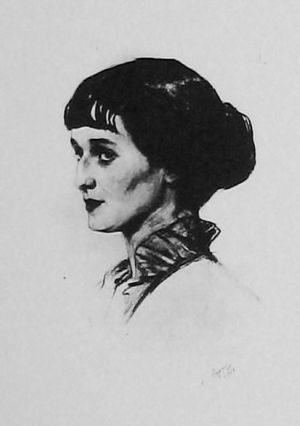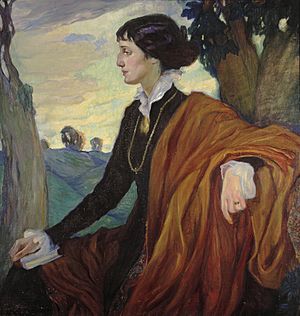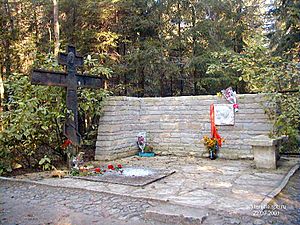Anna Akhmatova facts for kids
Quick facts for kids
Anna Akhmatova
|
|
|---|---|
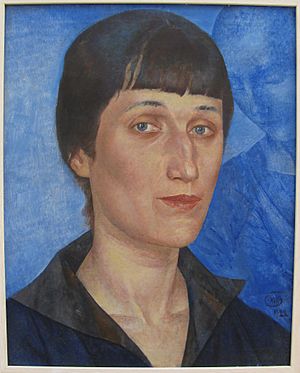
Akhmatova in 1922 (portrait by Kuzma Petrov-Vodkin)
|
|
| Born | Anna Andreevna Gorenko 23 June [O.S. 11 June] 1889 Odessa, Kherson Governorate, Russian Empire |
| Died | 5 March 1966 (aged 76) Moscow, Russian SFSR, Soviet Union |
| Occupation | Poet, translator, memoirist |
| Literary movement | Acmeism |
| Spouse |
Vladimir Shilejko
(m. 1918; div. 1926) |
| Partner | Nikolai Punin (died in GULAG labour camp in 1953) |
| Children | Lev Gumilev |
Anna Andreyevna Gorenko (born June 23, 1889 – died March 5, 1966) was a very important Russian poet of the 20th century. She is better known by her pen name, Anna Akhmatova. A pen name is a fake name a writer uses instead of their real name.
Akhmatova's poems range from short, emotional pieces to long, complex works. Her most famous long poem, Requiem (1935–40), tells the sad story of the Stalinist terror. This was a time when the government under Joseph Stalin arrested and punished many innocent people.
Her writing style was unique. It was simple, strong, and full of emotion, which was new for Russian poetry. She wrote in two main periods: early works (1912–25) and later works (from 1936 until her death). The Soviet government, led by Stalin, did not like her work and tried to stop it from being published. But Akhmatova chose to stay in the Soviet Union and write about the difficult events happening around her. Her poems often explored themes of time, memory, and the challenges of living under Stalin's rule.
There isn't a lot of information about Akhmatova's life from official records. Many documents were destroyed because of wars, revolutions, and the Soviet government. She was often out of favor with the government. Many people close to her suffered. Her first husband, Nikolay Gumilev, died because of the Soviet secret police. Her son, Lev Gumilev, and her partner, Nikolay Punin, spent many years in prison camps. Punin died in one of these camps.
Contents
Anna Akhmatova's Early Life
Anna Akhmatova was born in Bolshoy Fontan, a resort town near the Black Sea port of Odessa. Her father, Andrey Antonovich Gorenko, was a naval engineer. He came from a noble Ukrainian family. Her mother, Inna Erazmovna Stogova, was from Russian nobility.
When Anna was less than a year old, her family moved to Tsarskoye Selo, near St. Petersburg. They spent summers near Sevastopol when she was 7 to 13 years old. She went to Mariinskaya High School. After her parents separated in 1905, she finished school in Kiev. She studied law at Kiev University for a year, then switched to literature in St. Petersburg.
Akhmatova started writing poems at age 11. She was inspired by famous poets like Alexander Pushkin. Her first poems were published when she was a teenager. Her father did not want her to publish poems under his family name. So, she chose "Akhmatova," which was her grandmother's last name. It was a Tatar name.
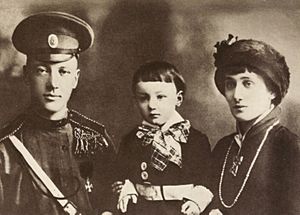
She met a young poet named Nikolay Gumilev in 1903. He encouraged her writing and asked her to marry him many times. In 1907, she published her first poem, "On his hand you may see many glittering rings," signing it "Anna G." She became well-known in St. Petersburg's art groups and often read her poems in public. She married Gumilev in Kiev in April 1910. Her family did not attend the wedding. They went to Paris for their honeymoon, where she met the artist Amedeo Modigliani.
In late 1910, she joined other poets like Osip Mandelstam to form the Guild of Poets. This group believed that poetry should be about clear, real things, not mysterious ideas. They focused on careful writing and craft. This group became known as the Acmeist school. After their first year of marriage, Gumilev traveled to Africa for six months.
Akhmatova became famous not just for her beauty, but for her strong and charming personality. She visited Modigliani again in Paris, and he painted her many times. In 1912, her son, Lev, was born. He later became a famous historian.
Becoming a Famous Poet
In 1912, the Guild of Poets published Akhmatova's first book of poems, Evening (Vecher). All 500 copies sold out quickly. She chose only 35 of her 200 poems for this book. The book made her known as a new and exciting writer. Poems like "Grey-eyed king" made her famous. She later said these "naïve poems by a frivolous girl" were reprinted many times and translated into other languages.
Her second book, The Rosary (Chetki), came out in March 1914. This book made her one of the most popular poets of her time. Many women started writing poems like hers. Akhmatova joked, "I taught our women how to speak, but don't know how to make them silent." People called her "Queen of the Neva" and "Soul of the Silver Age." The "Silver Age" was a special time for Russian poetry. In her later long poem, Poem Without a Hero, she remembered this time as a happy part of her life.
Akhmatova became good friends with Boris Pasternak. In July 1914, she wrote about "frightening times approaching." On August 1, Germany declared war on Russia. This started the "dark storm" of world war, civil war, and revolution in Russia. The Silver Age of poetry ended.
Akhmatova had a relationship with the artist and poet Boris Anrep. Many of her poems from this time are about him. He also made art featuring her. In 1917, she chose poems for her third book, Belaya Staya (White Flock). The poet Joseph Brodsky later said these poems had a feeling of "controlled terror."
In February 1917, the revolution began in Petrograd (St. Petersburg). The city faced many problems like no electricity or food. Many of Akhmatova's friends died or left Russia for safer places. Anrep went to England. Akhmatova thought about leaving but decided to stay. She was proud of this choice.
In 1918, at the height of her fame, she divorced Gumilev. That same year, she married Vladimir Shilejko, a poet and expert on ancient languages. Many of her friends thought this was a mistake.
Life in the Soviet Era
In 1921, Akhmatova's first husband, Nikolay Gumilev, was accused of being part of a plot against the government. He was shot and killed in August. This event deeply affected Russian writers and artists. It also put a bad mark on Akhmatova and her son, Lev. Lev was later arrested because he was Gumilev's son.
The new Soviet government did not like Akhmatova's poetry. They said it was too personal and "bourgeois," meaning it was for the rich and not for the revolution. She was attacked by the government and even by some former friends. Her work was unofficially banned in 1925, and it was hard for her to publish. But she kept writing poems. She also translated works by other famous writers like Victor Hugo. She studied Pushkin and Dostoyevsky. Many people in Russia and other countries thought she had died.
She had little food and money. Her son was not allowed to study at universities because of his parents' past. Many of her friends, artists, and thinkers in St. Petersburg were arrested or killed. Her close friend, the poet Osip Mandelstam, was sent to a prison camp where he died. Akhmatova herself was almost arrested. Her son, Lev, was put in prison many times by the Stalinist government. He was accused of working against the government. She often waited for hours outside prisons to bring him food and ask for his release. She described standing outside a stone prison, waiting.
Akhmatova wrote that by 1935, when she went to the train station to say goodbye to friends going into exile, she would see many other writers and thinkers leaving on the same train.
Akhmatova lived with Nikolai Punin, an art scholar, until 1935. He was also arrested many times and died in a prison camp in 1953. Her sad poem cycle, Requiem, tells about her personal experience during this terrible time. She wrote that "one hundred million voices shout" through her "tortured mouth."
War, Surveillance, and Recognition
In 1939, Stalin allowed one of Akhmatova's poetry books, From Six Books, to be published. But it was quickly taken off shelves and destroyed after only a few months. In 1993, it was found that the authorities had secretly listened to her conversations and watched her constantly. They kept detailed files on her, with about 900 pages of reports and notes. Even though her work was officially stopped, it was still shared secretly. Her friend Lydia Chukovskaya said that writers would memorize each other's poems. Akhmatova would write a poem on a piece of paper for a visitor to read, then burn it in her stove. This way, the poems were shared but not written down, to keep them safe.
During World War II, Akhmatova lived through the 900-day Siege of Leningrad (St. Petersburg). In 1940, she started her long poem Poem without a Hero. She worked on it for 20 years. She dedicated it to her friends and citizens who died during the siege. In 1942, she was moved to safer cities like Tashkent in Uzbekistan. She became very ill with typhus. When she returned to Leningrad in May 1944, she wrote that it felt like "a terrible ghost" of her city.
She often read her poems to soldiers in hospitals and on the front lines. Her later poems spoke for those who had suffered and survived. She started writing about more complex and philosophical ideas, moving away from romantic themes. Some of her patriotic poems even appeared on the front pages of Pravda, a major newspaper.
In 1946, the government started a campaign against writers like Akhmatova. They called her work "bourgeois" (for the rich). She was criticized for a visit from a Western philosopher, Isaiah Berlin, in 1945. A government official, Andrei Zhdanov, publicly called her work "the poetry of an overwrought, upper-class lady." He banned her poems from being published and accused her of harming Soviet youth. She was watched even more closely and kicked out of the Union of Soviet Writers.
Berlin described his visit to her apartment: "It was very barely furnished... Anna Akhmatova was immensely dignified, with unhurried gestures, a noble head, beautiful, somewhat severe features, and an expression of immense sadness."
Akhmatova's son, Lev, was arrested again in late 1949 and sent to a Siberian prison camp for 10 years. She spent many years trying to get him released. To do this, she published poems that openly supported Stalin and his government. Lev stayed in the camps until 1956, after Stalin died. Her efforts may have helped his release and saved her own life. However, Akhmatova never included these pro-Stalin poems in her official collections.
After Stalin's death in 1953, Akhmatova slowly began to be recognized again. She was allowed back into the Union of Writers in 1951. Her own poems started to reappear in 1956. That same year, Lev was released from the camps. He was bitter, believing his mother cared more about her poetry than about him. By 1958, Akhmatova's status as a great poet was confirmed with new books of her poems. Her most complete collection, Beg vremeni (The Flight of Time), was published in 1965. But her long poem Requiem, which criticized the Stalinist purges, was not included. Isaiah Berlin predicted it could never be published in the Soviet Union.
Last Years and Legacy
In her last years, Akhmatova continued to live with the Punin family in Leningrad. She kept translating, researching Pushkin, and writing her own poems. She worked to bring back poems that had been destroyed or hidden during the purges. She also worked on her official memories and her long poem Poem without a Hero, which took her 20 years to write.
Akhmatova was honored in both the Soviet Union and other countries. In 1962, she met the American poet Robert Frost. She also guided many young Soviet writers, like Joseph Brodsky. Brodsky, who was arrested in 1963, later won the Nobel Prize in Literature.
As one of the last great poets of the Silver Age, the Soviet authorities began to praise her. She was allowed to travel. At the same time, because of poems like Requiem, Akhmatova was seen as a leader of the movement against the government. She became a symbol of both the Soviet Union and old Tsarist Russia. Her popularity grew even more after her death. For her 75th birthday in 1964, new collections of her poems were published.
In 1965, Akhmatova was allowed to travel to Sicily and England. She received the Taormina prize and an honorary degree from Oxford University. Her poem Requiem was finally published in a book in Munich in 1963. It was not fully published in the Soviet Union until 1987.
In November 1965, Akhmatova had a heart attack. She died of heart failure on March 5, 1966, at age 76. Thousands of people attended her memorial ceremonies in Moscow and Leningrad. She was buried at Komarovo Cemetery in St. Petersburg.
In 1988, Harvard University held a conference to celebrate what would have been Akhmatova's 100th birthday. Today, you can learn about her work at the Anna Akhmatova Literary and Memorial Museum in St. Petersburg.
Akhmatova's Poetry and Themes
Akhmatova joined the Acmeist group of poets in 1910. This group focused on clear, simple writing and strong poetic form. They preferred real, concrete ideas over mystical ones. Akhmatova's first books, Evening (1912) and Rosary (1914), were very popular. They had short, emotional poems known for their clear language and vivid details. These early poems were mostly about love and often had a touch of sadness.
Her early poems often showed a man and a woman at an important, emotional moment in their relationship. Many people copied her style. One critic noted that Akhmatova could show "the vast range of evolving emotions experienced in a love affair." Her poems used simple, everyday language and objects to create deep psychological feelings. Like Alexander Pushkin, who was her role model, Akhmatova wanted to show a lot of meaning through small, precise details.
Akhmatova often felt that critics only saw her early romantic poems. They didn't know about the big changes in her later work, especially during the time of "The Terror." This was because her later work was kept secret. The risks during the government purges were very high. Many of her friends and family were exiled, imprisoned, or killed. Her son was always in danger of arrest. She was often watched closely. After the government stopped her work in the 1920s, many people thought she had died. Her readers didn't know about her later powerful works like Requiem or Poem without a Hero. These were only shared with a few trusted friends or passed around secretly by word of mouth.
Between 1935 and 1940, Akhmatova secretly wrote and rewrote the long poem Requiem. This poem is a sad song of mourning and a record of the suffering of ordinary people under Soviet terror. She carried it with her as she lived in different cities. It was left out of her collected works because it clearly criticized the purges. The poem was finally published in a book in Munich in 1963. It was not fully published in the Soviet Union until 1987. Requiem has ten poems that explore feelings like suffering, despair, and devotion. It doesn't tell a clear story. It uses ideas from the Bible, like Christ's crucifixion, to show the pain in Russia, especially for women in the 1930s. Through this poem, Akhmatova took on the role of telling the story of the Terror. She is still seen in this role today.
Her essays about Pushkin and Poem Without a Hero, her longest work, were only published after she died. This long poem, written between 1940 and 1965, is often seen as her best work. It gives a deep look at her time and her feelings about it. It also includes her important meeting with Isaiah Berlin in 1945. Akhmatova was also a talented translator. She translated works by poets writing in French, English, Italian, Armenian, and Korean.
Cultural Impact
- The American composer Ivana Marburger Themmen created music for Akhmatova's poems.
- Some of her poems were translated and set to music on the 2015 album The Trackless Woods by Iris DeMent.
- Anna Akhmatova is the main character in the Australian play The Woman in the Window by Alma De Groen.
- The Dutch composer Marjo Tal also set Akhmatova's poetry to music.
- The Ukrainian composer Inna Abramovna Zhvanetskaia created music for several of Akhmatova's poems.
- A porcelain figurine of Anna Akhmatova was made to celebrate her 35th birthday in 1924. It showed her in a grey dress with a red shawl. This figurine was very popular and was made many times over the years, even after her death. It became one of the most popular figurines in the Soviet Union. After the Soviet Union ended in 1993, her popularity grew even more, and the figurine was made again. Today, you can find her figurine in many homes in former Soviet countries.
Honors and Awards
- 1964 – Etna-Taormina prize (an Italian literary award)
- 1965 – Honorary doctorate from Oxford University (a special degree given by a university)
Selected Poetry Collections
Published by Akhmatova
- 1912 – Vecher (Evening)
- 1914 – Chetki (Rosary or Beads)
- 1917 – Belaya Staya (White Flock)
- 1921 – Podorozhnik (Wayside Grass/Plantain)
- 1921 – Anno Domini MCMXXI
- 1940 – From Six Books (publication stopped shortly after release)
- 1943 – Izbrannoe Stikhi (Selections of Poetry). Published in Tashkent.
- 1958 – Stikhotvoreniya (Poems)
- 1961 – Stikhotvoreniya 1909–1960 (Poems: 1909–1960)
- 1965 – Beg vremeni (The Flight of Time: Collected Works 1909–1965)
Later Editions (Published After Her Death)
- 1967 – Poems of Akhmatova. Edited and translated by Stanley Kunitz.
- 1976 – Anna Akhmatova: Selected Poems (translated by D. M. Thomas).
- 1985 – Twenty Poems of Anna Akhmatova (translated by Jane Kenyon).
- 1988 – Selected Poems (translated by Richard McKane).
- 2000 – The Complete Poems of Anna Akhmatova (translated by Judith Hemschemeyer; edited by Roberta Reeder).
- 2004 – The Word That Causes Death's Defeat: Poems of Memory (translated by Nancy Anderson).
- 2006 – Selected Poems (translated by D. M. Thomas).
- 2009 – Selected Poems (translated by Walter Arndt).
See also
 In Spanish: Anna Ajmátova para niños
In Spanish: Anna Ajmátova para niños
- Anna Akhmatova Literary and Memorial Museum
- Akhmatova's Orphans
Images for kids
 | Victor J. Glover |
 | Yvonne Cagle |
 | Jeanette Epps |
 | Bernard A. Harris Jr. |


